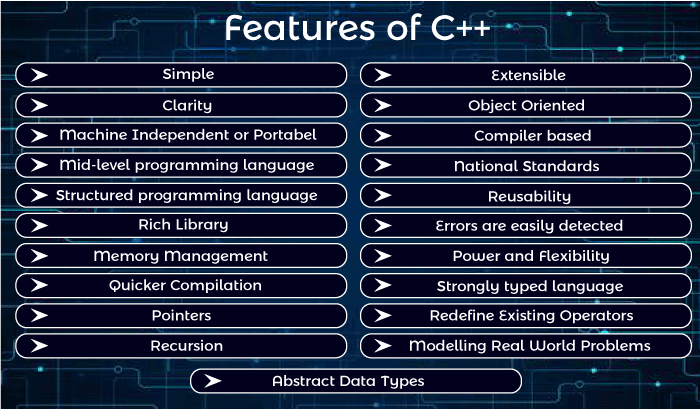History of C++ language is interesting to know. Here we are going to discuss brief history of C++ language.
C++ programming language was developed in 1980 by Bjarne Stroustrup at bell laboratories of AT&T (American Telephone & Telegraph), located in U.S.A.
Bjarne Stroustrup is known as the founder of C++ language.
C++ programming is "relative" (called a superset) of C, it means any valid C program is also a valid C++ program.It was develop for adding a feature of OOP (Object Oriented Programming) in C without significantly changing the C component.
Let's see the programming languages that were developed before C++ language.
| Language | Year | Developed By |
|---|---|---|
| Algol | 1960 | International Group |
| BCPL | 1967 | Martin Richard |
| B | 1970 | Ken Thompson |
| Traditional C | 1972 | Dennis Ritchie |
| K & R C | 1978 | Kernighan & Dennis Ritchie |
| C++ | 1980 | Bjarne Stroustrup |
C++ Features
C++ is object oriented programming language. It provides a lot of features that are given below.

- Simple
- Machine Independent or Portable
- Mid-level programming language
- Structured programming language
- Rich Library
- Memory Management
- Fast Speed
- Pointers
- Recursion
- Extensible
- Object Oriented
- Compiler based
1) Simple
C++ is a simple language in the sense that it provides structured approach (to break the problem into parts), rich set of library functions, data types etc.
2) Machine Independent or Portable
Unlike assembly language, c programs can be executed in many machines with little bit or no change. But it is not platform-independent.
3) Mid-level programming language
C++ is also used to do low level programming. It is used to develop system applications such as kernel, driver etc. It also supports the feature of high level language. That is why it is known as mid-level language.
4) Structured programming language
C++ is a structured programming language in the sense that we can break the program into parts using functions. So, it is easy to understand and modify.
5) Rich Library
C++ provides a lot of inbuilt functions that makes the development fast.
6) Memory Management
It supports the feature of dynamic memory allocation. In C++ language, we can free the allocated memory at any time by calling the free() function.
7) Speed
The compilation and execution time of C++ language is fast.
8) Pointer
C++ provides the feature of pointers. We can directly interact with the memory by using the pointers. We can use pointers for memory, structures, functions, array etc.
9) Recursion
In C++, we can call the function within the function. It provides code reusability for every function.
10) Extensible
C++ language is extensible because it can easily adopt new features.
11) Object Oriented
C++ is object oriented programming language. OOPs makes development and maintenance easier where as in Procedure-oriented programming language it is not easy to manage if code grows as project size grows.
12) Compiler based
C++ is a compiler based programming language, it means without compilation no C++ program can be executed. First we need to compile our program using compiler and then we can execute our program.
Comments
Post a Comment